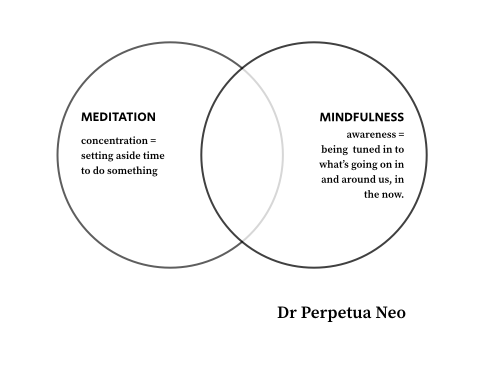Recently, someone told me she was really confused about the difference between mindfulness and meditation. “Am I doing mindfulness, meditation, or mindfulness meditation?”, she asked. Then she told me about how one friend was doing Zen meditation, and another Vedic meditation. I know, it sounds like a minefield.
THE DIFFERENCE BETWEEN MEDITATION AND MINDFULNESS
When you set aside time to do an activity that involves concentration, you are meditating.
- If you’re from the Judeo-Christian traditions, you pray (direct address to a spiritual entity) and contemplate (prolonged period of conscious thought about a certain topic).
- You can listen to or play music deeply as your meditation
- Hindu Yogic meditation focuses the mind on a single object.
- Transcendental Vedic-style meditation focuses on a mantra to liberate the mind to achieve pure consciousness (although some would disagree on the word ‘focus’)
- Buddhist meditation adds in the ‘awareness part’. There are different types. Like shamata (breath), vipashyana (insight), Zen, maitri (loving kindess), tantra, etcetera.
- Taoist meditation combines physical acts (yoga-style postures, meditation) with spirituality, and may use talismans.
[Sources: Elisha Goldstein & Ven. Henepola Gunaratana]
When you practise being aware of what’s going on in and around you, in the present moment, you’re being mindful. Mindfulness = ‘paying attention to your attention’.

MINDFULNESS MEDITATION
So, when you combine awareness and concentration, that’s mindfulness meditation. When you purposefully set aside time in everyday tasks, you’re also doing mindfulness meditation. Like my story of cleaning the frother.
Most of what we know as mindfulness meditation today is based on Jon Kabat-Zinn’s work. Learning from Zen teachers Thich Nhat Hanh and Seungsahn, he founded Mindfulness-Based Stress Reduction (MBSR). This is why MBSR texts often feature quotes by Thich. Later, Mindfulness-Based Cognitive Therapy (MBCT) was developed. Specifically for people who suffer from cycles of depression.
If you practise or use compassion-focused therapy, then you may have read about Pema Chödrön‘s or Chögyam Trungpa Rinpoche’s style of meditation. Shamatha-vipashyana is from the Shambala Tibetan Buddhist lineage.
Ready to master your busy mind, and go from Doubting To Done? If you’re a Type A Perfectionist who wants to launch your dream and sleep like a cat, book your free Chemistry Call here to find out about my signature 8-week programs that are tailored to your lifestyle, personality and goals.





